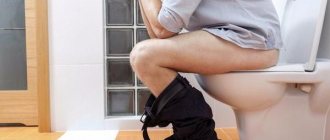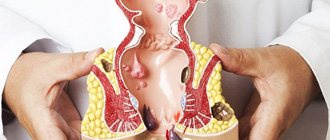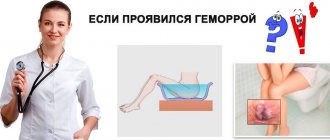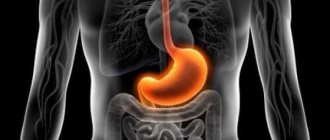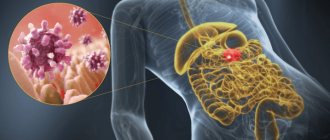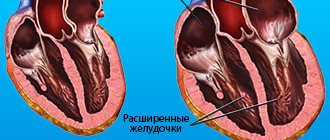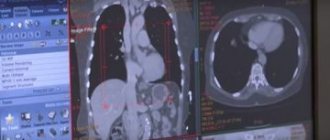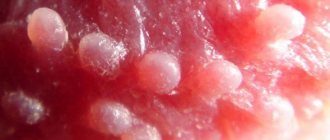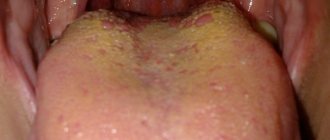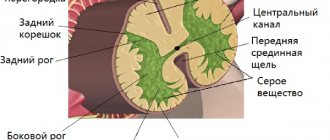What kind of symptom is this, what is the reason for its manifestation, how to relieve the pain and how to treat it, these are the first questions of people who experience a sharp contraction of the intestinal muscles, accompanied by unpleasant, painful sensations.
Causes of colic
The main reason for the appearance of painful sensations is a functional disorder of the intestines, the occurrence of periodic cramping pain.
The development of this pathology is influenced by many factors, for example:
- The presence of diseases of the gastrointestinal tract (gastritis, ulcers, colitis, etc.).
- Stretching of a loop of intestine.
- Straining when lifting or carrying heavy objects.
- Obstruction of processed food.
- Poisoning of any nature.
- Peritoneal injuries.
- Previous surgical interventions.
- Disturbances in the functioning of the endocrine system.
- Hormone dysfunction.
- Presence of cancer.
- Food allergies.
Sometimes the pathology is caused by non-compliance with a balanced diet, abuse of harmful foods, or an allergic reaction to food. Often the cause of colic is the presence of worms. In addition, the state of the body is affected by infectious ailments due to inflammation of the intestinal lymph and overstrain of the nervous system.
There is a risk group in which patients are most likely to experience colic. Among them:
- People over 45 years old.
- Patients who underwent strip surgery.
- Patients with adhesions in the abdominal cavity.
- People suffering from constant constipation.
- Suffering from intestinal bleeding.
Pain caused by stress goes away on its own, without the need to see a doctor. In other circumstances, attention should be paid to the appearance of such a symptom, since discomfort will occur intermittently, with increasing pain in the abdominal cavity. Seeing a doctor is a necessary measure for this situation.
Intestinal spasm, causes
Normally, intestinal contractions occur in peristaltic waves: ebb and flow. The muscles of different parts work alternately: from the duodenum to the sigmoid colon. The rectum does not participate in the act of peristalsis, and contraction of the sphincter is not a manifestation of intestinal colic. Intestinal spasm develops when there is extreme irritation of the walls of the intestinal tract, which is caused by the following harmful substances:
- Poisons;
- Parasites;
- Salts of heavy metals;
- Bacteria and viruses;
- Products of the breakdown of intestinal walls due to circulatory disorders.
During stress reactions, in extremely rare cases, intestinal spasms develop, the symptoms of which manifest themselves in the form of profuse loose stools. Basically, this reaction is typical for animals. Only people in creative professions who suffer from neurasthenia are susceptible to manifestations of “bear disease.”
Types of manifestations
Based on how the ailment manifests itself, it is classified as a specific type of pathology. There are several types:
- Acute manifestations.
- Rectal colic.
- Lead manifestations (with lead intoxication).
- Pancreatic colic.
- Appendicular pain (due to the inflammatory process in appendicitis).
- Liver colic.
- Intestinal malaise due to intussusception or obstruction.
Depending on the type of disease, its symptoms and causes of occurrence, you can choose the appropriate treatment.
Small intestinal spasm
When the mucous membrane of the small intestine is irritated, fluid absorption is impaired, resulting in diarrhea. Vomiting appears as a protective reaction of the body.
Developing spasm of the small intestine is characterized by bloating, uterine rumbling, headache, and decreased blood pressure.
As a result of uncontrollable vomiting and diarrhea, the body loses fluid and important electrolytes, including calcium. Intestinal colic is accompanied by cramps of the striated muscles. The calf muscles react first. General weakness develops rapidly. With viral and bacterial infections, body temperature rises.
Painkillers are used to relieve spasms of the small intestine, and intravenous infusions of saline solutions are used to treat dehydration.
Symptoms of pathology
The main symptom of the disease is paroxysmal, painful sensations that appear suddenly. In addition, there are a number of symptoms that indicate colic:
- Changes in stool (color, consistency, smell).
- Bloating.
- Flatulence, rumbling.
- Swelling of the genital organs (in women the labia, in men the groin area or testicles).
- Nausea, attacks of vomiting.
Depending on the cause that caused the pathology, other signs of the disease will appear. For example, if you have a food allergy, you may notice eosinophil crystals in your stool that resemble sputum.
Gastrointestinal ailments manifest themselves as “sheep stool”, the feces become hard, covered with a mucous film or pus. For intestinal obstruction, a characteristic symptom can be considered the absence of feces. Lead poisoning causes a rim to appear on the gums.
Each type of colic has its own symptoms:
- With rectal colic, severe pain is felt when you have the urge to have a bowel movement.
- Appendicular colic manifests itself as pain in the iliac region. The first 2-3 hours after an attack of appendicitis, the pain can be acute and unbearable.
- The development of lead colic is accompanied by plaque on the gums, severe pain, and elevated body temperature.
- Pancreatic colic is often accompanied by swelling in the pancreas, nausea, or diarrhea.
If such symptoms appear in an adult, it is dangerous to postpone a visit to the doctor, since the malaise will return each time in an intensified state.
Intestinal spasms, symptoms
The following symptoms are characteristic of irritable bowel syndrome:
- The appearance of pain around the navel;
- Feeling of heaviness in the lower abdomen;
- Constipation;
- Diarrhea;
- Flatulence;
- Belching of air, nausea and vomiting.
In severe cases, headaches occur, chills and cold sweats appear. If intestinal spasm is provoked by acute intestinal obstruction or thrombosis of mesenteric vessels, symptoms increase instantly. The pain spreads throughout the abdomen, the anterior abdominal wall becomes tense. With this development of the disease, the “quiet period” is especially dangerous, during which the pain disappears. Loss of sensitivity of the intestinal mucosa indicates the death of receptors due to the onset of necrosis.
Diagnosis of illness
To diagnose colic in a patient, the doctor will need to collect all the information about the symptoms of the disease, visually assess the condition of the skin, its color and consistency, then palpate the peritoneum. In addition, you will need to take a number of tests: blood (general, biochemical), feces, urine. Assess the internal state of the intestines using ultrasound, computed tomography, magnetic resonance imaging, endoscopy, gallbladder examination, colonoscopy, sigmoidoscopy.
To obtain more accurate results in the study, a consultation and examination with a surgeon will be required. This is necessary to exclude appendicitis, obstruction, and intussusception. After receiving a complete picture of the pathology, the attending physician will prescribe therapeutic measures that will relieve the patient from further manifestations of discomfort.
First aid
If severe pain suddenly arises, you can use emergency methods at home. It should be borne in mind that such emergency methods have a short-term effect, and using them constantly is dangerous to health.
- If discomfort occurs, which was caused by nervous tension, it is recommended to take a sedative. You are allowed to drink 2 tablets of No-shpa; a decoction of mint, which should be taken with the medicine, will have a positive effect. An equally effective way is to take Smecta. One packet of powder should be diluted in half a glass of warm water. You are allowed to drink a decoction of chamomile flowers or immortelle herb.
Before the doctor arrives, it is strictly forbidden to apply warm or cold heating pads to the stomach, do an enema, or administer medications to loosen stool. These methods are permitted after an initial examination by a doctor. If permission has been given, you can apply a warm heating pad to the groin area. If possible, you should do an enema with decoctions of lemon balm or chamomile flowers. This will get rid of gases, which will significantly relieve an attack of colic.
- An effective way to relieve intestinal spasms is to take a bath. The water temperature should be comfortable for humans, but not hot. For poisoning, you should take activated charcoal or enterosgel.
- If necessary, it is allowed to use rectal suppositories or drugs Becarbon, Becaldin and the like. It is prohibited to drink anything other than unsweetened tea with crackers for 12 hours.
The above methods should be used with caution. It is forbidden to take medications without consulting a doctor. If signs of deterioration appear, you should immediately call a doctor or go to the nearest hospital.
What causes intestinal colic
The main cause of painful intestinal spasm is persistent impairment of motor function. The walls of the organ experience strong stretching, sending a corresponding signal to the brain. The muscles try to restore their previous state by contracting more than usual. Thus, throughout the intestine, areas with stretched, atonic walls and zones of spasmodic muscles alternate. Stagnation of food coma, constipation, bloating occurs. The resulting toxins enter the bloodstream, provoking symptoms of general poisoning - uncontrollable vomiting, loss of strength.
Factors that provoke intestinal motility disorders leading to painful spasms:
- gastritis, enteritis, stomach and intestinal ulcers of a chronic or acute nature;
- pathologies of the liver, pancreas;
- inflammation of the appendix of the cecum;
- poor nutrition - too hot or cold food, dry, coarse foods, spicy, fatty, smoked;
- viral infections with intestinal tropism;
- poisoning by toxins of food infections - salmonellosis, E. coli and others;
- poisoning by poisonous mushrooms, plant toxins;
- harmful working conditions and poor ecology are common causes of chronic or acute poisoning with heavy metal salts;
- damage to the intestines by parasitic worms that block the lumen of the organ and secrete toxins that irritate the walls;
- blockage of the intestine by a neoplasm, fecal stones, or foreign body increases peristalsis, designed to push through the “plug” and restore the unhindered movement of food;
- people with a special type of nervous activity experience significant emotional stress during exams, interviews, important negotiations and in other situations. The intestines react with spasms, pain, and indigestion. However, the symptoms quickly disappear after the traumatic factor is eliminated.
In reality, there are many more causes of spasms in the intestines; each organism exhibits an individual response to unfavorable environmental conditions. In life there is a combination of provoking factors and their mutual influence. For example, a person who lives in an ecologically unfavorable area and comes into contact with chemical agents at work has received food poisoning.
Therapeutic measures
When choosing a treatment method, the reasons that led to the appearance of colic are taken into account. For example, in case of a pathological process resulting from an infectious disease, antibacterial drugs will be required. This therapy is performed in an infectious diseases hospital.
In case of intestinal obstruction, medications are prescribed that help soften stool and then remove it. In extreme cases, when the obstruction is severe, surgery may be necessary.
If colic was caused by acute respiratory diseases, then the manifestation will begin no earlier than 2 days later. For this case, the use of antibiotics is not required. You are allowed to take vitamins, anti-spasm medications, and activated charcoal.
To treat colic that occurs due to infection with worms, you can take Pyrantel or Decaris. These medications have a strong effect in the treatment of helminthiasis.
For a speedy recovery, you can use a set of therapeutic measures, supplementing drug therapy with diet and traditional methods.
Intestinal spasm, treatment
In case of intestinal colic, it is necessary to relieve the pain, and then undergo an examination to identify the cause of the intestinal irritation. In case of acute pain, you need to act differently. On the contrary, taking all painkillers that smooth out the clinical picture is prohibited. You can determine on your own whether an intestinal spasm has occurred or whether a surgical pathology has begun that requires immediate surgery. If the symptoms are smoothed out, the appearance of pain is clearly associated with food intake, one should think that the cause is intestinal spasm, which can be treated without surgery.
Traditional methods of therapy
The use of folk recipes for the treatment of antispasmodic manifestations has shown good results. But this method has a number of contraindications, like any remedy. It is important to remember that when choosing one of the recipes, you need to take into account the individual tolerance of the components.
To check for allergies, it is enough to take the minimum dosage of the drug. If no negative effects occur, therapy can begin.
It is recommended to first discuss this issue with your doctor, since some medications are not always combined with the components of traditional recipes.
- pumpkin seeds
For one glass of boiling water, 2 tablespoons of seeds. Add a small amount of sugar, then take this infusion every day for five days.
- Lavender oil
Lavender flower oil not only eliminates colic, but also calms the nervous system, which will be indispensable if colic was associated with stress. Add 4-6 drops of oil to a glass of warm water. Then drink the product in one dose.
- Tansy
Add 30 g of tansy flowers to a glass of hot water. Let it brew, then take small sips throughout the day. The course of therapy is no more than 3 days.
- Cabbage juice
Cabbage juice has a strong effect; it should be taken diluted before the first meal. Half a glass is enough.
- Ginger root tea
Ginger tea has no less effect than cabbage juice. Add half a teaspoon to hot water, stir, add a little honey, let it brew.
- White wormwood
For 100 g of herb, half a liter of cold water, leave for at least 48 hours. Then cook the infusion for 50-60 minutes, remove from heat, pass through a filter, add 0.4 kg of honey. Cook until thick. For therapy, take a spoonful 4 times a day.
Traditional recipes will only be effective if used correctly. If you are allergic to any drug, you should discard it.
Recommendations
To reduce the load on the intestines, it is recommended to exclude foods that are harmful to the body from the diet.
- You will need to give up fried or pickled foods, smoked foods, and sweets. Beans, cabbage and other foods that can lead to large amounts of gas should be removed from the diet. Avoid salty foods completely. Minimize the consumption of meat or fish dishes.
- It is allowed to eat only low-fat fish, cereals, and vegetable-based dishes.
- It is recommended to drink fermented milk drinks, fruits that have a lot of fiber, and fortified decoctions.
- In addition to the diet, you must follow a certain diet. Eat food at least 4-6 times a day. It is forbidden to overeat or refuse a full meal for a long time. It is not recommended to eat freeze-dried foods, semi-finished products, or eat on the run. The last meal should not be taken less than 2 hours before bedtime.
- An equally important point is the drinking regime. Drink clean still water (at least 1.5 liters per day), this indicator depends on the weight category.
It is important to remember that the diet is balanced and healthy, since a person’s health depends on the foods consumed.
If the patient's condition improves, the doctor allows a gradual return to a normal diet.
It is recommended to adhere to a not very strict diet even for people who do not have health problems. This measure is preventive in nature. A properly selected diet will help avoid problems with the gastrointestinal tract.
Complications
The most serious complication for the patient is death or extremely serious condition. It’s better not to let it come to this. In addition, in the absence of quality therapy, the patient may experience painful shock, as some attacks become unbearable for the body. Possible fall into a coma.
Infectious pathology can cause serious intoxication in the body. A similar effect will occur if intestinal obstruction is ignored. The constant impact of pain on the body causes serious emotional distress. Therefore, such symptoms should not be ignored, especially if they appear regularly.
Colon spasm
Involvement of the large intestine in the process is accompanied by an increased urge to defecate, which alternates with constipation. If the large intestine, where feces are formed, is irritated, patients experience incomplete emptying after defecation.
When spasm of the large intestine becomes chronic, anemia develops in the human body and blood clotting is impaired. This occurs due to a lack of vitamins that are synthesized in the colon.
https://youtu.be/3fyyk0WQUTw
Preventive measures
Prevention allows you to reduce the risk of encountering illness. In order to avoid pathologies, it is recommended to follow the rules of hygiene, this applies to hygiene of hands, food, dishes, and premises.
- You need to eat right, choosing the most successful regime and diet individually for yourself.
- You should lead an active lifestyle, play sports, strengthen your immune system, and avoid various stressful situations.
The main thing is to contact a medical facility in a timely manner, at the first signs of illness. In addition, for preventive purposes, it is recommended to undergo an annual comprehensive examination of the whole body. Then it is possible to identify ailments in the early stages of development, which means that treatment will require significantly less time and the risk of complications is reduced.
